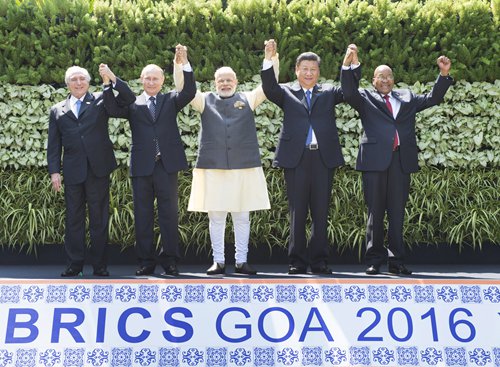Belt and Road
Your Present Location: PROGRAMS> Belt and RoadWang Yiwei: China’s Belt and Road initiative to be further fleshed out in 2017
Source: Global Times Published: 2016-12-25

President Xi Jinping attended the 8th BRICS Summit in Goa, India, with Brazilian President Michel Temer and Russian President Vladimir Putin, Indian Prime Minister Narendra Modi and South African President Jacob Zuma (from left to right), on October 16,2016. Photo: Xinhua
China is expected to further promote its Belt and Road initiative next year against the backdrop of rising resentment over globalization and the new Donald Trump administration in the US, as the initiative will be linked with the UN 2030 Agenda for Sustainable Development at a summit hosted by China, experts said.
The coming year will see a summit on the Belt and Road initiative and the ninth BRICS summit, which are two major conferences for China`s home field diplomacy, Foreign Minister Wang Yi said in an interview with the People`s Daily on Thursday.
"Holding the two summits comes at the right time when both the trend of anti-globalization among developed economies and calls for greater globalization in the developing countries still exist," Ni Feng, deputy director of the Institute of American Studies at the Chinese Academy of Social Sciences, told the Global Times.
Belt and Road
"The international cooperation summit forum on the Belt and Road initiative … will be a strategic measure to boost the world economy, an important platform to deepen international cooperation and China`s innovative practice to implement the concept of win-win cooperation," Wang said in a speech at the opening of the Symposium On International Developments and China`s Diplomacy on December 3.
The Belt and Road initiative refers to the Silk Road Economic Belt and the 21st-Century Maritime Silk Road initiative proposed by President Xi Jinping in 2013. The initiative seeks to bring together countries all around the world via overland and maritime networks to promote mutually beneficial cooperation, according to the Xinhua News Agency.
"China`s `going-out` strategy has been confronted with grave difficulties as the anti-globalization sentiment permeating developed countries such as the US, the UK and Italy has thwarted economic recovery worldwide," Ni said.
The recovery is workable only when resources and capital have been allocated across borders, Ni noted, suggesting more specific cooperation plans on the initiative should be rolled out at the forum next year.
"Through hosting the forum, we will lay out the blueprint for `Belt and Road` construction, deepen the integration of respective development strategies and carry out more cooperation projects, so as to inject strong impetus into fostering an open economic pattern and revitalizing the world economy," the foreign minister said.
While other countries have echoed China`s proposal to collaborate on the Belt and Road initiative on bilateral occasions, a lack of multilateral negotiation has hampered the promotion of the initiative since several projects involve more than two countries and need the introduction of international standards, Wang Yiwei, a research fellow of international relations at the Renmin University of China, told the Global Times.
So far, over 100 countries and international organizations have expressed their willingness to support and join the initiative. China has signed cooperation agreements on the initiative with more than 40 countries and international organizations, Wang Yi said.
In 2016, a breakthrough was made in developing multilateral economic corridors under the Belt and Road initiative as China, Mongolia and Russia officially signed plans to build an economic corridor. Steady progress is also being made in synergizing the initiative with the Eurasian Economic Union.
"To dismiss suspicions that the initiative is simply a clique led by China to draw other countries to its side, the UN 2030 agenda will be integrated with the Belt and Road initiative at the forum, demonstrating that the proposal concerns the common development of all human beings," Wang Yiwei noted.
Global governance
"China will play a positive role in coordinating multilateral [discussion] on global governance via the two high-level forums," Su Ge, president of the China Institute of International Studies, told the Global Times.
The ninth BRICS (Brazil, Russia, India, China and South Africa) summit is scheduled to be hosted by China in the southeastern city of Xiamen in September 2017.
China expects to work with all parties concerned to implement the agreements reached at previous summits, deepen their partnerships, and write a new chapter for BRICS cooperation, President Xi said in October in the Indian state of Goa.
"The summit in Xiamen is seen by many as a milestone for BRICS cooperation as its members strive for strong, sustainable, balanced and inclusive global growth," Zhu Jiejin, deputy director with the Center for BRICS Studies at Shanghai`s Fudan University, was quoted by Xinhua as saying.
The summit will provide some member states within the BRICS block with an opportunity to turn to China when Western countries cannot be relied on, Ni said.
Citing India as an example, he said the south Asia country has to seek cooperation with China in a bid to obtain industrial capacity transfer, since Western countries are reluctant to further transfer their industries overseas.
Echoing Ni, Wang Yiwei said China`s solutions to the world sluggish economy may be embraced by more countries facing a political backlash against globalization, including the US` possible shift toward trade protectionism after Trump takes office in January 2017.
During the annual BRICS summit in Goa, President Xi laid out a five-point proposal. The proposal included cooperative programs such as building an open world, mapping out a shared development vision and coping with the most pressing global challenges, Xinhua reported.
Wang Yiwei is a senior fellow at Chongyang Institute for Financial Studies, Renmin University of China.
Key Words: BRICS; Summit; China; Wang Yiwei























































































 京公网安备 11010802037854号
京公网安备 11010802037854号





